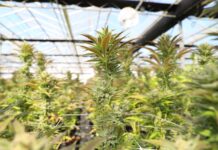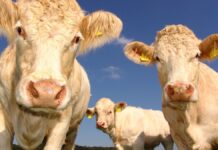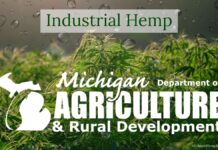Background
In 2014, Section 7606 of the Federal Agricultural Act (a.k.a. Farm Bill; Appendix A) legalized the growth and cultivation of industrial hemp for agricultural or academic research by institutions of higher education in states where such research is legal under state law. Michigan’s Industrial Hemp Research Act, Act 547 of 2014 (Appendix B), signed into law on 15 January 2015, provided that legalization in Michigan. This document provides guidelines for colleges or universities interested in performing research on industrial hemp authorized by these statutes.
Definition of Industrial Hemp
The state and federal laws referenced above define industrial hemp as the plant Cannabis sativa L. and any part of the plant, whether growing or not, containing a delta-9 tetrahydrocannabinol (THC) concentration of no more than three-tenths of one percent (0.3%) on a dry weight basis. The Michigan Department of Agriculture and Rural Development (MDARD) considers all other taxa formally or informally placed within the genus Cannabis as subspecies or varieties of C. sativa L. in accordance with Small, E. and A. Cronquist. 1976. A practical and natural taxonomy for Cannabis. Taxon 35(4): 405-435.
MDARD’s Authorities and Responsibilities
Section 7606 of the Farm Bill requires that MDARD certify and register all sites used for growing or cultivating industrial hemp for agricultural or academic research. Certification is MDARD’s formal approval of each growing site. Registration is the process by which MDARD maintains records of certified sites.
MDARD will certify proposed research sites by:
Reviewing the completeness and accuracy of each Application for Industrial Hemp Growing Site Certification.
Confirming that the applicant is an employee or student at the college or university stated in the application, and that the administration of the college or university consents to the proposed research.
Confirming that the proposed industrial hemp research site exists and is described accurately in the application.
Confirming that the college or university stated affiliated with application owns, leases, rents, or otherwise controls the property on which the industrial hemp growing site is located.
If approved by the Director of MDARD, applicants will receive an official certification document for each site that has been certified for industrial hemp research. Research sites that are certified will be held on file at MDARD to meet the registration requirement and will be provided to the Michigan State Police and other cooperating agencies as needed.
Legal Requirements for Researchers
Only Michigan colleges and universities may grow or cultivate industrial hemp in Michigan, and all industrial hemp grown or cultivated must be for agricultural or academic research purposes.
All industrial hemp growing sites must be certified by, and registered with, MDARD. To have sites certified and registered, a qualifying researcher must complete and submit to MDARD an application package that includes:
- One completed application form for each proposed growing site.
- Proof that the college or university rents, leases, or otherwise controls the property on which the proposed growing site is located (if not on college- or university-owned property.)
- A cover letter on official college or university letterhead formally requesting certification and signed by an authorized representative of the college’s or university’s administration. This letter should include responses to the following questions:
– What are your research objectives?
– What varieties of industrial hemp will be grown and what is the source of seed?
– What method will be used to test the plants for their THC concentration and where will this testing occur?
– How do you intend to dispose of or process the industrial hemp at the conclusion of research?
Certification will be valid for one year from the date of issuance.
Industrial hemp cannot be planted at a proposed growing site until the applicant has received an official certification document for that site from MDARD.
Industrial hemp transported as part of this program must include within each shipment a letter on the college’s or university’s letterhead providing notice that industrial hemp authorized under the Industrial Hemp Research Act is included in the shipment.
Recommendations for Researchers
DEA Registration.
Researchers growing or cultivating industrial hemp must possess a Controlled Substances Registration Certificate from the U.S. Drug Enforcement Agency (DEA). Applications are available online. MDARD recommends that this certificate be pursued early in the development of a research program because of potential delays.
Seed.
Neither the Farm Bill nor the Industrial Hemp Research Act makes legal provision for the procurement of industrial hemp seed. Because industrial hemp seed cannot be distinguished from other Cannabis seed morphologically or chemically, care should be taken to ensure with the highest possible degree of certainty that procured seeds are, in fact, industrial hemp. The procurement of seed from uncertified, obscure, or feral sources that results in the growth of plants with a THC content greater than 0.3% by dry weight will place the researcher, college or university, and/or property owner in violation of state and federal law.
The highest degree of certainty will be obtained by procuring seeds only from sources regulated by robust industrial hemp seed certification programs. For example, Health Canada maintains a list of approved cultivars at www.hc-sc.gc.ca/hc-ps/pubs/precurs/list_cultivars-liste2012/index-eng.php. These cultivars are tested annually and are consistently below the legal threshold for THC of 0.3% by dry weight.
Procuring viable hemp seed from foreign countries (including Canada) requires a DEA Permit to Import Controlled Substances for Domestic and/or Scientific Purposes.
Applications are available online. MDARD recommends that this permit be pursued early in the development of a research program because of potential delays. MDARD also recommends contacting U.S. Customs and Border Protection (CBP) at the port of entry through which the seed will enter the United States to identify CBP-specific shipment requirements
Testing.
To ensure compliance with State and Federal law, MDARD recommends that industrial hemp plants be laboratory tested for THC concentration when fully grown. Testing typically occurs approximately two weeks prior to harvest to maximize the detectable THC concentration. MDARD cannot at this time recommend a testing procedure, but Health Canada details standard operating procedures for sampling, testing, and processing industrial hemp at www.hc-sc.gc.ca/hc-ps/pubs/precurs/tech-man-eng.php. In the event that plants contain THC concentrations higher than the allowed 0.3% by dry weight, MDARD will coordinate with researchers and law enforcement as needed to ensure that the plants are disposed of properly.
Security.
MDARD strongly recommends that growing sites be secured behind locked doors, fences, or by remote geography to minimize the likelihood of vandalism, theft, or use of growing sites as hiding locations for marijuana plants. MDARD may not be able to protect growing site location information from Freedom of Information Act requests.
Contacts
Mike Philip, Plant Industry Specialist Michigan Department of Agriculture and Rural Development P.O. Box 30017, Lansing MI 48909 517-284-5649 | 517-512-0187 philipm@michigan.gov
Robin Rosenbaum, Plant Industry Section Manager Michigan Department of Agriculture and Rural Development P.O. Box 30017, Lansing MI 48909 517-284-5646 rosenbaumr@michigan.gov























